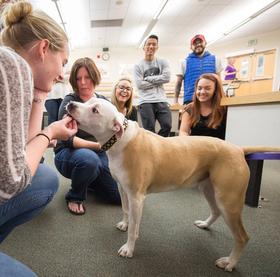If you’re worried about the economy and job market when considering your future career plans, don’t fear! There are a variety of career options that are expected to be steady amidst a dwindling economy.
According to the United States Bureau of Labor Statistics and Kiplinger, the field with the greatest job security in tough economic times is the health care industry. As the country’s aging residents are fueling a need for greater health care services, experts anticipate a rising demand for care occupations. To pursue an economically “safe” pathway, choose from one of the three popular recession proof health care programs at your local community college: geriatric care, hospice support, and physician assistant programs.
Recession Proof Health Care Careers
Geriatric Care
As our steadily aging population maintains a rising life expectancy, students can be assured that a career in geriatrics will be not only be important, but also very stable. While a rising number of community colleges are creating programs to specifically train individuals for elderly care, most currently enrolled students can pursue a specialization in geriatrics as they complete their nursing certification program.
For example, students attending Nunez Community College (NCC), located in Chalmette, Louisiana, can enroll in courses that offer training, education, and hands on experience with elderly patients. As NCC states, students will learn about ethical and legal aspects of elderly care, and participants will also study the “Theories and concepts of aging, the physiologic and psychosocial changes and problems associated with the process, and the appropriate nursing interventions are discussed.” By enrolling in the NCC geriatric courses, students will be able to learn the basic principals that pertain to the aging population, as well as how to create individualized care plans while implementing both psychological and biological accommodations.
Upon completing a nursing program or specialized geriatric program, graduates will be able to work in various health care facilities, including nursing homes, hospitals, and even home health care career options.
Hospice Support
With rising life spans, more and more senior citizens are considering hospice support to aid in their elderly years. Hospice, unlike a typical hospital, offers at home support and individualized attention. As the American Cancer Society explains, hospice is an overall philosophy that accepts death as a final and calm stage of life. Additionally, “The goal of hospice is to enable patients to continue an alert, pain-free life and to manage other symptoms so that their last days may be spent with dignity and quality, surrounded by their loved ones.”
Hospice workers help families care for their loved one, as well as assist in making important decisions pertaining to the patient’s health and comfort. The care provided by hospice workers is offered 24 hours a day, 7 days a week, as the health and conditions of the patient can fluctuate greatly in a short period of time. Ideally, patients utilize hospice care from their homes; however, many hospice workers also provide support at nursing homes, hospitals, and other locations.
To pursue a career in hospice care, community college students have a wide array of options. In fact, the International Longevity Center recently published a list of the top elderly care and hospice programs administered by community colleges in 2008. Ranked as the best school for elderly care, Brookhaven Community College, located in Dallas, Texas, now provides students with two groundbreaking program options: the continuing education program focusing on Home Health Care and Hospice Aide, alongside the Family Caregiver program.
Also ranked among the top ten schools was Hartford Community College, located in Bel Air, Maryland. At Hartford, students can learn from In-Home Aide training options, which focus on care giving for end-of-life issues. To train students, Hartford collaborates with local hospitals, hospice centers, and non-profit health care centers.
Physician Assistant Programs
As the cost of health care continues to rise, hospitals, medical offices, and insurance companies are all seeking to cut their costs. Since there’s little to no room to cut jobs in the health care field, many hospitals and offices are seeking to hire physician assistants instead of doctors.
While doctors earn a higher wage (due to their lengthy education), physician assistants can provide similar care at a lower cost. Leading the educational options for students interested in physician assistant programs is Riverside Community College (RCC), located in Riverside, California. As RCC explains, their physician assistant program “Was established in the community to ameliorate the shortage of health care providers in a diverse growing population.”
With quality training opportunities, expert instructors, and hands on training, students can pursue a recession-proof career right from their local community college!
Questions? Contact us on Facebook @communitycollegereview.















